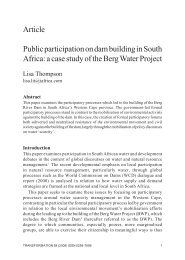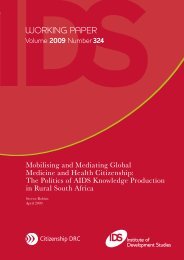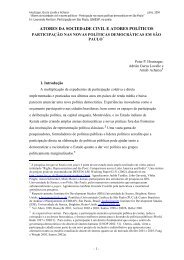Associations and the Exercise of Democratic ... - Citizenship DRC
Associations and the Exercise of Democratic ... - Citizenship DRC
Associations and the Exercise of Democratic ... - Citizenship DRC
You also want an ePaper? Increase the reach of your titles
YUMPU automatically turns print PDFs into web optimized ePapers that Google loves.
IDS WORKING PAPER 285<strong>the</strong> enjoyment <strong>of</strong> rights <strong>and</strong> entitlements constitutive <strong>of</strong> contemporary citizenship.The tradition in political science has been to focus on political participation, butmany <strong>of</strong> <strong>the</strong> new democracies fall particularly short on this civil dimension.Fur<strong>the</strong>rmore, with <strong>the</strong> dramatic expansion <strong>of</strong> both government’s duty to act <strong>and</strong>forms <strong>of</strong> societal accountability in <strong>the</strong> short twentieth century, this civil dimensionhas become increasingly important.The findings pose a particular challenge to <strong>the</strong> society-centered focus found in <strong>the</strong>civic engagement debate. The different types <strong>of</strong> relations individuals have togovernment across <strong>the</strong> two cities, irrespective <strong>of</strong> <strong>the</strong>ir citizens’ common belief thatgovernment has <strong>the</strong> primary responsibility for providing access to public goods,points to <strong>the</strong> fact that <strong>the</strong> polity itself plays an important role in shaping activecitizenship. A society-centered approach cannot explain <strong>the</strong> difference in patternsbetween <strong>the</strong> two cities. And however much associations contribute to <strong>the</strong> civicvalues or skills <strong>of</strong> citizens, individuals who participate <strong>and</strong> who do not participate inassociations have <strong>the</strong> same types <strong>of</strong> relations to government – whe<strong>the</strong>r it is directrelations in São Paulo or detached or mixed relations in Mexico City.In our view, creating civil relations that conform more closely to <strong>the</strong> ideal under<strong>the</strong> democratic rule <strong>of</strong> law may depend less on individual citizens’ values orbehaviour than on that <strong>of</strong> collective actors such as labour movements, socialmovements, networks <strong>of</strong> civil organisations <strong>and</strong> on <strong>the</strong> larger political game thatplays out in <strong>the</strong> institutional arena <strong>of</strong> <strong>the</strong> party system <strong>and</strong> institutions <strong>of</strong>representative democracy. Associational life, through its effect on individual citizens,does not produce a change in <strong>the</strong> type <strong>of</strong> civil relations to government. The quality<strong>of</strong> <strong>the</strong> polity clearly does not improve as a result <strong>of</strong> <strong>the</strong> higher levels <strong>of</strong> activecitizenship to which associations contribute.A number <strong>of</strong> studies in affluent democracies show that participation in <strong>the</strong>associational sphere, or civil society, has a strong class bias but in much democratic<strong>the</strong>ory <strong>the</strong> assumption remains that this sphere is egalitarian <strong>and</strong> free <strong>of</strong> obstaclesto collective action. 46 Our findings confirm that associational participation is highlystratified outside <strong>of</strong> affluent western democracies as well. Even in cities such asSão Paulo <strong>and</strong> Mexico City, settings that are more likely to favour relatively equalparticipation, we find remarkable stratification across education, gender, <strong>and</strong>labour market status. As a consequence, associations have only a limited, <strong>and</strong> adifferentiated, impact on <strong>the</strong> stratification <strong>of</strong> active citizenship, reducingeducation-based stratification to some extent but potentially increasing o<strong>the</strong>rs,such as that by gender. The differences in forms <strong>and</strong> levels <strong>of</strong> stratificationbetween São Paulo <strong>and</strong> Mexico City, however, do warn against making a priori <strong>and</strong>simplistic claims about <strong>the</strong> inherent inegalitarian nature <strong>of</strong> associational life.Political parties have historically played a central role in <strong>the</strong> political <strong>and</strong> legalconstruction <strong>of</strong> citizenship <strong>and</strong> in mediating citizen-government relations. In thispaper we have examined citizens’ relations to political parties only in terms <strong>of</strong> <strong>the</strong>latter’s brokerage role. We do not examine citizens’ relations to parties in terms <strong>of</strong><strong>the</strong>ir political-electoral role, as our concern is <strong>the</strong> civil dimension <strong>of</strong> citizenship <strong>and</strong>46 Putnam (2000); Verba et al. (1995); Rosenstone <strong>and</strong> Hansen (1993).40





